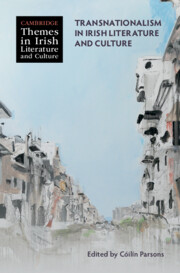Book contents
- Transnationalism in Irish Literature and Culture
- Cambridge Themes in Irish Literature and Culture
- Transnationalism in Irish Literature and Culture
- Copyright page
- Contents
- Acknowledgments
- Contributors
- Introduction: A Weak Theory of Transnationalism
- Part I Transnational Genealogies
- Part II Planets
- Part III Missed Translations
- Chapter 10 Sounding Authentic: Renditions of Central and Eastern European Literature by Irish Writers
- Chapter 11 Irish Literature, (Irish-)American Culture, and “Hiberno-American Blandness”
- Chapter 12 Ngundalehla Godotgai: A Bundjalung Version of Waiting for Godot
- Part IV Transnational Futures
- Select Bibliography
- Index
Chapter 12 - Ngundalehla Godotgai: A Bundjalung Version of Waiting for Godot
from Part III - Missed Translations
Published online by Cambridge University Press: 13 November 2024
- Transnationalism in Irish Literature and Culture
- Cambridge Themes in Irish Literature and Culture
- Transnationalism in Irish Literature and Culture
- Copyright page
- Contents
- Acknowledgments
- Contributors
- Introduction: A Weak Theory of Transnationalism
- Part I Transnational Genealogies
- Part II Planets
- Part III Missed Translations
- Chapter 10 Sounding Authentic: Renditions of Central and Eastern European Literature by Irish Writers
- Chapter 11 Irish Literature, (Irish-)American Culture, and “Hiberno-American Blandness”
- Chapter 12 Ngundalehla Godotgai: A Bundjalung Version of Waiting for Godot
- Part IV Transnational Futures
- Select Bibliography
- Index
Summary
Suspecting it was more widely known for its sporting prowess than its culture, Australia decided to stage four arts festivals prior to hosting the 2000 Olympics. The first, held in 1997, celebrated the indigenous cultures of the world, with prominence given to Aboriginal Australia. Conceived as the “Festival of the Dreaming,” it featured, in addition to dance, storytelling, and art, performances of Waiting for Godot in Bundjalung. It was hoped parallels between the play’s universal themes and historical Aboriginal experience – a politics of waiting and existential despair – would reveal indigenous culture. In the event, this was not realized. This chapter explores some of the reasons why. Audiences heard Bundjalung spoken but it proved so mellifluous that the expected interplay of antagonism and resignation voiced in English did not take place. Audiences could follow the English text cued as sur-titles but given ignorance of Bundjalung they could not appreciate they were hearing a transliteration. Audiences could see the cast interacting, but they were not aware that the protocols of Aboriginal conversation had been set aside. While the Bundjalung Waiting for Godot was years ahead of its time, it continues to raise issues for the notion of global Irish studies.
Keywords
- Type
- Chapter
- Information
- Transnationalism in Irish Literature and Culture , pp. 225 - 242Publisher: Cambridge University PressPrint publication year: 2024

